植物性饮食模式与癌症和心脏代谢疾病多发病的年龄特异性风险:一项前瞻性分析
IF 14.6
Q1 GERIATRICS & GERONTOLOGY
引用次数: 0
摘要
背景:目前尚不清楚以植物为基础的饮食模式是否会影响非传染性疾病的进展,以及多病的相关风险是否随年龄而变化。本研究旨在调查植物性饮食与多病风险的关系,多病的定义是一个人同时患有至少两种慢性疾病(任何部位的癌症、心血管疾病或2型糖尿病)。方法:这项前瞻性队列研究使用了来自6个欧洲国家的EPIC和UK Biobank的数据,招募时参与者年龄为35-70岁。我们从这些队列中排除了基线时患有癌症、心血管疾病或2型糖尿病或缺乏饮食或健康结果数据的参与者。饮食习惯的数据在基线时通过一份关于前12个月饮食习惯的有效问卷或在大约一年的随访期间通过几份24小时回忆问卷进行评估。采用Cox回归的多状态模型,根据健康植物性饮食指数(hPDI)和不健康植物性饮食指数(uPDI)分别估计多种疾病的风险。对60岁以下和60岁及以上成年人的风险差异进行了评估。研究结果:407618名参与者(来自EPIC的226 324名和来自UK Biobank的181 294名)被纳入本研究。EPIC的中位随访时间为10.9年,UK Biobank的中位随访时间为11.4年,两个队列共发生了6604例癌症-心脏代谢多病事件。hPDI评分增加10分与多病风险降低相关,EPIC的风险比(HR)为0.89 (95% CI 0.83 - 0.96), UK Biobank的风险比(HR)为0.81 (95% CI 0.76 - 0.86)。在两个队列中,老年人的这种负相关比中年人略弱。在UK Biobank中,60岁以下成年人的hPDI评分每增加10分,多变量调整后的hr为0.71 (95% CI为0.65 - 0.79),60岁及以上成年人的hr为0.86 (95% CI为0.80 - 0.92)(p交互作用= 0.0016)。EPIC组的hr分别为0.86 (95% CI 0.78 ~ 0.95)和0.92 (95% CI 0.84 ~ 0.02), p交互作用= 0.32。在UK Biobank中,较高的不健康植物性饮食依从性与多病风险呈正相关(uPDI每增加10个点的HR为1.22,95% CI为1.16 -1·29),但在EPIC中没有得到复制(1.00,0.94 -1·08)。解释:健康的植物性饮食可能会减少中老年人癌症和心脏代谢疾病的多重发病率。资助:韩国政府(科学和信息通信技术部)。本文章由计算机程序翻译,如有差异,请以英文原文为准。
Plant-based dietary patterns and age-specific risk of multimorbidity of cancer and cardiometabolic diseases: a prospective analysis
Background
It is currently unknown whether plant-based dietary patterns influence disease progression to multimorbidity after an initial non-communicable disease, and whether the associated risk of multimorbidity varies with age. This study aimed to investigate associations of plant-based diets with the risk of multimorbidity, defined as the co-occurrence of at least two chronic diseases in an individual (either cancer at any site, cardiovascular disease, or type 2 diabetes).
Methods
This prospective cohort study used data from EPIC and UK Biobank across six European countries, with participants aged 35–70 years at recruitment. We excluded participants from these cohorts who had cancer, cardiovascular disease, or type 2 diabetes at baseline or those with missing data on diet or health outcomes. Data on dietary habits were assessed either at baseline through a validated dietary questionnaire about habits in the previous 12 months or through several 24-h recall questionnaires during approximately a year of follow-up. Multistate modelling with Cox regression was used to estimate the risk of multimorbidity according to a healthful plant-based diet index (hPDI) and, separately, an unhealthful plant-based diet index (uPDI). Risk differences in adults younger than 60 years and those age 60 years and older were estimated.
Findings
407 618 participants (226 324 from EPIC and 181 294 from UK Biobank) were included in this study. During a median follow-up time of 10·9 years in EPIC and 11·4 years in UK Biobank, 6604 cancer–cardiometabolic multimorbidity events occurred in both cohorts combined. A ten-point increment of the hPDI score was associated with a lower risk of multimorbidity, with a hazard ratio (HR) of 0·89 (95% CI 0·83–0·96) in EPIC and 0·81 (0·76–0·86) in UK Biobank. This inverse association was marginally weaker in older adults than in middle-aged adults in both cohorts. In UK Biobank, a ten-point increment of the hPDI score was associated with multivariable-adjusted HRs of 0·71 (95% CI 0·65–0·79) in adults younger than 60 years and 0·86 (0·80–0·92) in those aged 60 years and older (pinteraction=0·0016). The respective HRs in EPIC were 0·86 (95% CI 0·78–0·95) and 0·92 (0·84–1·02; pinteraction=0·32). A higher adherence to an unhealthy plant-based diet was positively associated with multimorbidity risk in UK Biobank (HR per ten-point increment of uPDI 1·22, 95% CI 1·16–1·29), but this was not replicated in EPIC (1·00, 0·94–1·08).
Interpretation
A healthy plant-based diet might reduce the burden of multimorbidity of cancer and cardiometabolic diseases among middle-aged and older adults.
Funding
The Korean Government (Ministry of Science and ICT).
求助全文
通过发布文献求助,成功后即可免费获取论文全文。
去求助
来源期刊

Lancet Healthy Longevity
GERIATRICS & GERONTOLOGY-
CiteScore
16.30
自引率
2.30%
发文量
192
审稿时长
12 weeks
期刊介绍:
The Lancet Healthy Longevity, a gold open-access journal, focuses on clinically-relevant longevity and healthy aging research. It covers early-stage clinical research on aging mechanisms, epidemiological studies, and societal research on changing populations. The journal includes clinical trials across disciplines, particularly in gerontology and age-specific clinical guidelines. In line with the Lancet family tradition, it advocates for the rights of all to healthy lives, emphasizing original research likely to impact clinical practice or thinking. Clinical and policy reviews also contribute to shaping the discourse in this rapidly growing discipline.
 求助内容:
求助内容: 应助结果提醒方式:
应助结果提醒方式:


